
Dr. Gregory Grauer discusses what causes this abnormal result, including a new culprit that pet owners may be giving as a treat.

Dr. Grauer received his DVM degree from Iowa State University in 1978. He then completed his postgraduate training (internship, residency, and master’s degree) at Colorado State University between 1978 and 1982. Dr. Grauer obtained his specialty board certification in Internal Medicine in 1983. After his postgraduate training, he became a member of the faculty at the School of Veterinary Medicine, University of Wisconsin for seven years and then returned to the Department of Clinical Sciences at Colorado State University where he served as professor and section chief of Small Animal Medicine until 2000. Dr. Grauer is professor and head of the Department of Clinical Sciences at the College of Veterinary Medicine, Kansas State University. Dr. Grauer’s areas of clinical and research interest involve the small animal urinary system.

Dr. Gregory Grauer discusses what causes this abnormal result, including a new culprit that pet owners may be giving as a treat.

Dr. Gregory Grauer addresses which drugs commonly used in dogs and cats are potentially nephrotoxic.

Dr. Gregory Grauer weighs in on whether NSAIDs can be used in dogs with liver or kidney disease.

Persistent proteinuria of renal origin is an important marker of chronic kidney disease (CKD) in dogs and cats. Unfortunately, due to the high incidence of false-positive results for proteinuria on the urine dipstick screening test and proteinuria associated with lower urinary tract inflammation, positive reactions for urine protein are quite common and therefore often disregarded.

By altering pre-glomerular resistance, healthy kidneys can maintain relatively stable glomerular capillary pressures despite variations in systemic blood pressure. This process is termed "renal autoregulation". Autoregulation can be reduced when renal disease results in loss of nephrons.

Azotemia is defined as increased concentrations of urea and creatinine (and other nonproteinaceous nitrogenous substances) in the blood. The interpretation of serum urea nitrogen and creatinine concentrations as a measure of renal function requires a knowledge of the production and excretion of these substances.

Most bacterial infections of the lower urinary tract respond quickly to antimicrobial treatment; however, urinary tract infections (UTI) associated with defects in the host immune system (complicated UTI) often fail to respond or recur after antibiotic withdrawal and can be a therapeutic challenge.

Chronic kidney disease (CKD) is a common problem that affects an estimated 0.5 to 7% of dogs. Radiographic signs of osteoarthritis (OA) occur in 20% of dogs.

Hyperthyroidism is one of the most commonly diagnosed diseases of the older cat. Geriatric cats with hyperthyroidism may also have concurrent chronic kidney disease (CKD). Systemic hypertension, proteinuria, and urinary tract infection (UTI) can be consequences of either hyperthyroidism or CKD.

Proteinuria is routinely detected by semi-quantitative, screening methods, like the conventional dipstick colorimetric test (very common) and the sulfosalicylic acid (SSA) turbidimetric test (less common). The dipstick test is inexpensive and easy to use. This test primarily measures albumin, however both the sensitivity and specificity for albumin are relatively low with the dipstick methodology.

Hyperthyroidism is one of the most commonly diagnosed diseases of the older cat. Geriatric cats with hyperthyroidism may also have concurrent chronic kidney disease (CKD). Systemic hypertension, proteinuria, and urinary tract infection (UTI) can be consequences of either hyperthyroidism or CKD.

Azotemia is defined as increased concentrations of urea and creatinine (and other nonproteinaceous nitrogenous substances) in the blood. The interpretation of serum urea nitrogen and creatinine concentrations as a measure of renal function requires a knowledge of the production and excretion of these substances.

Most bacterial infections of the lower urinary tract respond quickly to antimicrobial treatment; however, urinary tract infections (UTI) associated with defects in the host immune system (complicated UTI) often fail to respond or recur after antibiotic withdrawal and can be a therapeutic challenge.

Chronic kidney disease (CKD) is a common problem that affects an estimated 0.5 to 7% of dogs. Radiographic signs of osteoarthritis (OA) occur in 20% of dogs. The majority of OA and CKD are acquired and both conditions are more prevalent in older dogs. Use of non-steroidal anti-inflammatory drugs (NSAIDs) has dramatically improved the quality of life for many dogs with OA.

Systemic hypertension in animals has largely been thought to be secondary to another disease (e.g., renal disease and endocrinopathies), as opposed to idiopathic (primary or essential). This has recently been called into question. For example, in a report of 69 hypertensive cats, seen at North Carolina State University (NCSU) for ocular disease, revealed that at least 17%, and possibly as many as 50%, of cats had no identifiable cause for their systemic hypertension.

Chronic kidney disease (CKD) is a common problem that affects an estimated 0.5 to 7% of dogs and 1.6 to 20% of cats. Nephron damage associated with CKD is usually irreversible and can be progressive. Renal failure results when three-quarters or more of the nephrons of both kidneys are not functioning.

Acute kidney injury (AKI) often results from ischemic or toxic insults and usually affects the most metabolically active tubular portions of the nephron. If the ischemic or toxic insult is severe enough, acute renal failure (ARF) may result. In many cases, AKI and ARF inadvertently develop in the hospital setting in conjunction with diagnostic or therapeutic procedures.
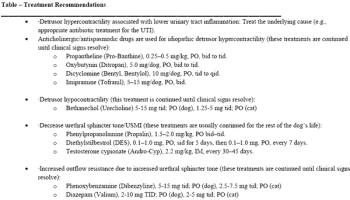
Micturition is controlled by a combination of autonomic and somatic innervation. Sympathetic innervation to the bladder via the hypogastric nerve is composed of preganglionic fibers exiting the lumbar spinal cord from the L1-4 spinal cord segments and synapsing in the caudal mesenteric ganglion.
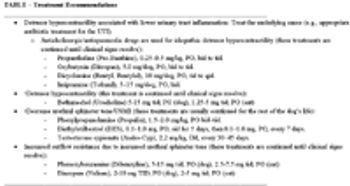
Disorders of micturition encompass problems with urine storage (i.e., leakage or incontinence) and bladder emptying (i.e., urine retention).

Chronic kidney disease (CKD) is a common problem that affects an estimated 0.5 to 7% of dogs and 1.6 to 20% of cats.
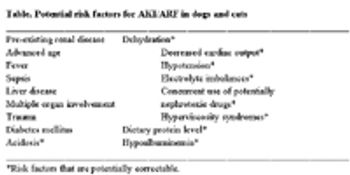
Acute kidney injury often results from ischemic or toxic insults and usually affects the most metabolically active tubular portions of the nephron.

Azotemia is defined as increased concentrations of urea and creatinine (and other nonproteinaceous nitrogenous substances) in the blood.

Use of non-steroidal anti-inflammatory drugs (NSAIDs) has dramatically improved the quality of life for many dogs with OA.

Renal damage and disease can be caused by acute or chronic insults to the kidney.
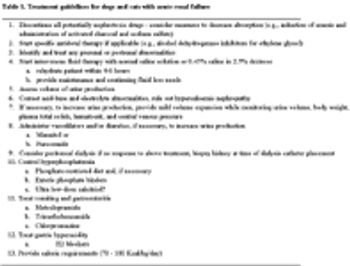
Renal failure results when approximately three fourths of the nephrons of both kidneys cease to function.
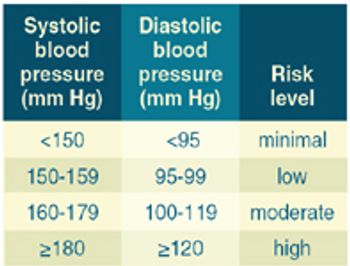
By altering pre-glomerular resistance, healthy kidneys can maintain relatively stable glomerular capillary pressures despite variations in systemic blood pressure. This process is termed "renal autoregulation."
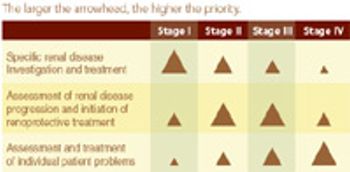
Chronic kidney disease (CKD) occurs over a period of months to years and is a leading cause of morbidity and mortality in dogs.

Suggested Reading for the article, "Staging and management of canine chronic kidney disease," by Gregory Grauer (DVM InFocus, March 2009)

Many forms of glomerular disease are thought to be associated with the presence of immune complexes in glomerular capillary walls.

Chronic kidney disease (CKD) is a common problem that affects an estimated 0.5 to 7% of dogs and 1.6 to 20% of cats.

Published: October 5th 2012 | Updated:

Published: July 30th 2012 | Updated:

Published: August 1st 2010 | Updated:

Published: August 1st 2010 | Updated:

Published: August 1st 2010 | Updated:

Published: August 1st 2010 | Updated: